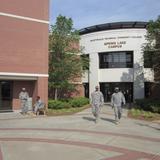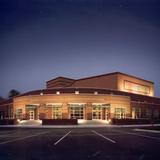- Robeson Community College is a comprehensive, open-door two-year public institution of higher learning with a mission to enhance the lifelong educational opportunities for adults appropriate to their needs, interests, and abilities. The College achieves its mission through a commitment to quality programs and services that permit students to pursue their educational goals in a student-centered environment. Additionally, the College seeks to strengthen the diverse social, economic, and cultural opportunities for the citizens of Robeson County and surrounding region.
School Highlights
Robeson Community College serves 2,626 students (34% of students are full-time).
The college's student-teacher ratio of 11:1 is lower than the state community college average of 13:1.
Minority enrollment is 80% of the student body (majority American), which is more than the state average of 48%.
Quick Facts (2026)
- Enrollment: 2,626 students
- In-state tuition: $2,386
- Out-state tuition: $8,530
- Student-teacher ratio: 11:1
- Minority enrollment: 80%
- Source: Verified school update
Top Rankings
Robeson Community College ranks among the top 20% of public schools in North Carolina for:
Category
Attribute
Diversity
School Overview
The teacher population of 230 teachers has stayed relatively flat over five years.
Robeson Community College
(NC) Community College Avg.
Carnegie Classification
Associate's Colleges: High Career & Technical-High Traditional
Associate's Colleges: Mixed Transfer/Career & Technical-High Nontraditional
Institution Level
At least 2 but less than 4 years
At least 2 but less than 4 years
Institution Control
Public
Public
Total Faculty
230 staff
256 staff
School Calendar
Student Body
The student population of Robeson Community College has grown by 43% over five years.
The student-teacher ratio of 11:1 has decreased from 12:1 over five years.
The Robeson Community College diversity score of 0.72 is more than the state average of 0.66. The school's diversity has stayed relatively flat over five years.
Total Enrollment
2,626 students
2,579 students
Student-Teacher Ratio
11:1
13:1
# Full-Time Students
903 students
766 students
# Part-Time Students
1,723 students
1,813 students
# Enrollment Undergraduate
262 students
316 students
# Full-Time Undergraduate Students
903 students
766 students
# Full-Time Graduate Students
n/a
22 students
# Part-Time Undergraduate Students
1,723 students
1,990 students
# Part-Time Graduate Students
n/a
3 students
Total Dormitory Capacity
n/a
717 students
% American Indian/Alaskan
43%
1%
% Asian
1%
3%
% Hispanic
12%
13%
% Black
20%
21%
% White
20%
52%
% Hawaiian
n/a
1%
% Two or more races
n/a
3%
% Non Resident races
n/a
1%
% Unknown races
3%
5%
Diversity Score
0.72
0.66
College Completion Rate (Students who graduate in less than 4 years)
41%
37%
College Completion Rate (Students who graduate in 4 years or more than 4 years)
n/a
43%
Average Graduate Earnings (10 Years)
$24,600
$27,500
Tuition and Acceptance Rate
The public in-state tuition of $2,386 is less than the state average of $3,915. The in-state tuition has declined by 6% over four years.
The public out-state tuition of $8,530 is less than the state average of $9,508. The out-state tuition has stayed relatively flat over four years.
In-State Tuition Fees
$2,386
$3,915
Out-State Tuition Fees
$8,530
$9,508
% Students Receiving Some Financial Aid
90%
82%
Median Debt for Graduates
$10,500
$10,500
Median Debt for Dropouts
$10,019
$5,700
Acceptance Rate
n/a
82%
SAT Reading
n/a
488
SAT Math
n/a
498
ACT Composite
n/a
20
ACT English
n/a
13
ACT Math
n/a
16
Source: 2024 (or latest year available) Integrated Postsecondary Education Data System (IPEDS) , School Administrators
School Notes
- The community college movement expanded into Robeson County with establishment of an extension unit of a nearby technical institute in 1965. The unit was established at the Barker Ten-Mile Elementary School seven miles north of Lumberton. Twenty full-time curriculum students enrolled the first year. When the College became independent of Fayetteville Technical Institute three years later, it was named Robeson Technical Institute, and a local Board of Trustees comprised of eight members was appointed. Two more name changes have taken place since that time to its present name of Robeson Community College. However, the College remains committed to serving all sectors of the county with vocational, technical, college transfer, and continuing education programs. Three building phases beginning in 1972 and finishing in 1988 made the RCC campus a 187,547 square-foot facility which now houses over $2 million in equipment and 21 curriculum programs, along with a variety of continuing education programs. RCC is located in Lumberton, North Carolina. RCC is a member of North Carolina's nationally recognized community college system, serving more than 3,000 credit and 19,000 non-credit students on an annual basis. Robeson Community College is a tax-assisted, two-year public institution. It is accredited by the Commission on Colleges of the Southern Association of Colleges and Schools to award the associate degree. Most programs offered by the College have been approved for the enrollment of eligible veterans. RCC is also accredited by the North Carolina Board of Nursing, Commission on Accreditation of Allied Health Education Programs and the Joint Committee for Respiratory Therapy Education, the North Carolina Board of Cosmetic Arts and Redken Laboratories in New York, New York.
Frequently Asked Questions
How much does Robeson Community College cost?
Robeson Community College's tuition is approximately $2,386 for In-State students and $8,530 for Out-State students.
What schools are Robeson Community College often compared to?
Robeson Community Collegeis often viewed alongside schools like Fayetteville Technical Community College by visitors of our site.
What is Robeson Community College's ranking?
Robeson Community College ranks among the top 20% of community college in North Carolina for: Diversity in US community colleges and Average community college minority breakdown.
Recent Articles

5 Key Community College Trends Parents Should Know in 2026
Explore major 2026 community college trends including enrollment changes, costs, career programs, and affordability for parents planning college decisions.

Average Community College Tuition Cost 2026 Update
Explore updated 2026 community college tuition averages, cost trends, planning tips, admissions timing advice, and financial strategies for families and students.

Preparing for Placement Tests in 2026: Student Guide
Preparing for Placement Tests in 2026, what students, parents, and educators need to know about formats, prep strategies, and placement changes.











